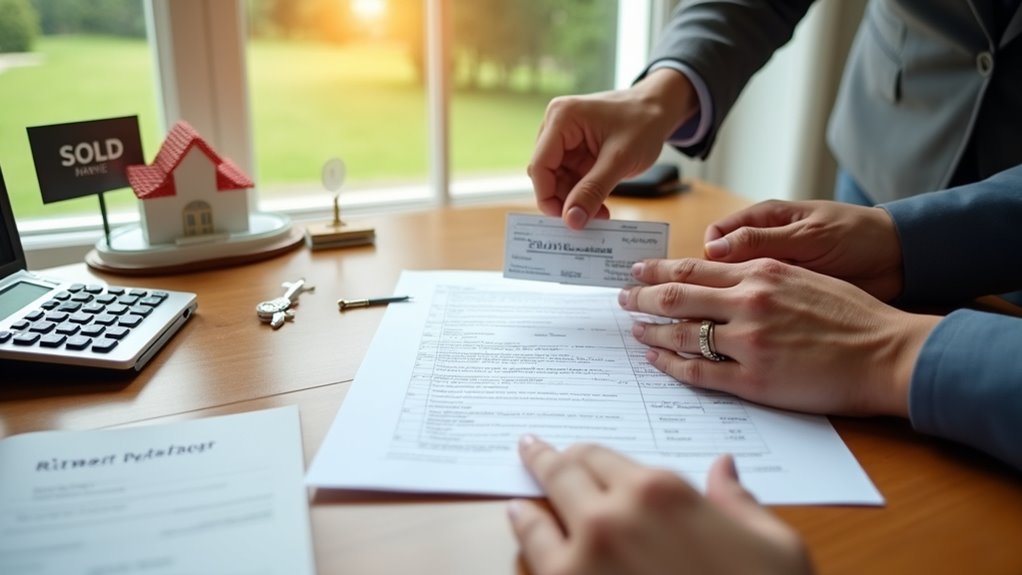Selling a house can be stressful, especially when unexpected problems arise. Nearly one in five home sales face title issues, and property liens are a leading cause. These claims can stall or even prevent your sale from going through.
Buyers and lenders want a clear title. If you have liens, you may lose buyers or face costly delays. You could even have your sale blocked until the liens are resolved. You can remove liens before selling a house by identifying, addressing, and clearing them as soon as possible.
This blog will guide you through each step so you can sell your home without unwanted surprises or delays. Follow these steps to make your sale go smoothly.
Key Takeaways
- Identify all existing liens by reviewing public records, title reports, and official notices before listing your property for sale.
- Pay off outstanding debts or negotiate settlements with lienholders, requesting written payoff statements and proof of lien release.
- Work with a real estate attorney or title company to verify the lien removal process and ensure compliance with legal requirements.
- Submit official lien releases to the county recorder to clear the property title and provide documentation for the sale.
- Address liens early in the selling process to avoid delays, contract cancellations, or reduced buyer interest at closing.
Understanding What a Lien Is

A lien is a legal claim that someone can place on your property if you owe them money. This claim means you cannot sell or transfer your property easily until the debt is paid. The lien gives the creditor a way to collect what you owe. Certain liens, such as involuntary types like tax or judgment liens, can be particularly challenging and may require specific steps to resolve before you can move forward with a sale.
Homeowners need to know that liens can make selling a house difficult. If a lien is on your property, you must clear it before finalizing a sale. Ignoring a lien could lead to legal trouble or loss of ownership.
If you understand what a lien is, you can take steps to resolve it quickly. Handling liens before selling helps protect your rights as a property owner. Always check for liens before you list your house for sale.
A clear title is essential for selling your home, since any outstanding liens must be resolved before you can legally transfer ownership to a new buyer.
Common Types of Property Liens
You’ll encounter several types of property liens that can affect your home sale, including mortgage liens, tax liens, and judgment liens. Each type comes with its own legal and financial implications, so it’s crucial to understand how they work.
Sellers are legally obligated to clear or disclose known faults, damages, or issues associated with any liens before finalizing a property sale. By identifying the specific lien on your property, you can take targeted steps to resolve it before listing your home. Some sellers in Platte City choose to work with real estate investment companies that buy homes as-is, regardless of liens or repairs needed.
Mortgage Liens Explained
A mortgage lien is a legal claim your lender has on your home when you take out a mortgage. This lien must be paid off before you can sell your house. If you do not pay off the lien, you cannot transfer ownership.
The lender will require a payoff statement before the sale can go through. You must settle this debt during the closing process. Any money left after paying the lender is called your equity.
If the sale price does not cover the mortgage, you may need to restructure your loan. Sometimes, sellers must bring extra money to closing. Always check your loan details to avoid surprises.
Tax Liens Overview
Tax liens are legal claims placed on your property if you owe back taxes. These liens can make selling your house difficult. A tax lien tells others that the government has a right to your property until you pay your taxes.
The process starts when the IRS or your local tax office files a public notice of your debt. This notice warns lenders and buyers about the claim. If the lien is attached, it can prevent you from selling your home easily.
To remove the lien, you must pay the full amount you owe or set up a payment plan. After you pay, the IRS or local agency will release the lien. Once released, your property title is clear, allowing a smooth sale.
Judgment Liens Impact
Judgment liens make selling your house much harder. They are not just simple debts; they attach to your property title. This means you usually cannot sell your house until the lien is paid off.
Any buyer or lender who checks the title will see the lien. If the lien shows up, it can stop the sale process. You must clear the lien for the sale to move forward.
Judgment liens also change the order in which debts are paid. They usually come after tax liens but before other debts without collateral. If your sale price is low, you may get less money after paying off the lien.
If you want an easy closing, you cannot ignore judgment liens. These liens lower buyer trust and give you less power to negotiate. You may have to pay the debt before you can complete the sale.
How Liens Affect Your Home Sale
Liens on your property can lower your sale price and discourage potential buyers. You’ll also face delays in closing if the lien isn’t resolved before settlement. To avoid these setbacks, address any outstanding liens early in the process.
If you’re considering a swift transaction, resolving liens quickly is especially critical to avoid complications during a fast home sale. Consulting with local real estate agents can help you understand how liens may impact your asking price and overall marketability.
Impact on Sale Price
A lien on a property usually lowers its sale price. Buyers see liens as risks and may offer less money. Some buyers may avoid properties with liens altogether.
A lien reduces your bargaining power because buyers know the property has financial issues. If you have a lien, you might need to accept a lower offer. The number of interested buyers may also decrease.
Liens are listed in public records, making your property look less attractive. You must resolve or pay off the lien before selling. If you remove the lien, your property can regain its full market value.
Delays in Closing
Unresolved liens can slow down the closing process. Buyers and lenders need clear title before completing the sale. If there are liens, closing will be delayed until they are resolved.
Some liens include unpaid taxes, contractor bills, or court judgments. If you do not disclose liens, buyers might lose trust or back out. Title companies will find liens, which can cause further delays.
You may have to pay off debts or negotiate with lienholders. These steps can add weeks or even months to your timeline. If you order a title search early and fix all liens, you can avoid these problems.
Taking care of liens early helps the sale go smoothly. It also reassures buyers and reduces the risk of last-minute issues. If you act quickly, you increase the chance of a successful sale.
Identifying Liens on Your Property

You need to find out what liens are on your property before you can remove them. Liens are legal claims against your home for unpaid debts. You can check local public records or online databases to see if any liens exist.
Liens may come from unpaid property taxes, overdue utility bills, or contractor payments. You should also look for notices sent by mail, as these often alert you to new liens. If you ignore them, you may face problems when selling your home. It’s also important to understand that local transfer taxes may apply when you sell a property, especially if any liens remain unresolved.
Some common liens include unpaid property taxes, mechanic’s liens, judgment liens, and HOA fees. Each lien must be handled separately to clear your property title. Accurate identification helps you resolve these issues more easily. When reviewing potential liens, it’s also important to consider how property value factors like location, neighborhood comps, and home condition may impact your ability to resolve debts and attract buyers.
Reviewing Your Title Report
A title report lists all claims, liens, and judgments against your property. You must review this report to know what issues exist. If you do not check it carefully, problems may arise during your sale.
The report shows important details like names, amounts, and legal descriptions. Mistakes in these details can cause delays. It is especially important to verify whether any marital property claims are noted, as these can affect ownership and sale rights. If you find something confusing, contact your title company or a real estate attorney.
Title insurance protects you from unknown claims but will not remove current liens. Any listed lien or claim must be resolved before closing. Careful review helps you avoid surprises and makes your sale process smoother.
Many sellers find that all-cash offers from cash home buyers can further streamline the process, especially when complicated title issues are involved.
Contacting the Lienholder

Contact the lienholder as soon as you find a lien on your property. You need to ask about the payoff amount and what is required to remove the lien. This step is important because it may affect your selling process. Reach out to the lienholder right away to learn the payoff amount and steps needed to clear the lien from your property.
Have all property and lien documents ready before you call. If you do not have the right information, the process may take longer. Always request written proof of the total payoff amount. When communicating with the lienholder, be alert for lack of transparency in their responses or unclear information about the payoff process.
Ask about the exact payoff balance and how to make the payment. Find out what documents you need to provide for the lien release. If there are any fees, confirm the amount and how to pay them.
Check how long it will take to release the lien after payment. Get the contact details of someone you can reach if you have more questions. If you cover these points early, you can focus on improving your home for buyers.
For sellers interested in a fast closing, efficient closing and quick sales are often possible when working with cash buyers.
Negotiating Payoff Amounts
After you’ve identified the lienholder, reach out directly to request an official payoff statement outlining the exact amount owed. Review this document carefully, as you may have room to negotiate the payoff or even settle for less in some cases. By approaching the lienholder with a clear understanding of your position, you can often secure more favorable terms and clear the title efficiently.
If you plan to sell your home as-is without inspection, understanding your payoff options can streamline the sale and attract buyers seeking a quick transaction. You may also benefit from professional design when preparing documentation or marketing your property, as this can help draw serious cash buyers and expedite the process.
Contacting Lien Holders
Contacting lien holders is necessary to resolve any liens on your property. You should reach out to each lien holder directly. This step helps you find out how much you owe and how to clear the lien.
Make sure you know who the lien holder is and how to contact them. If you are unsure about the lien’s order, ask about its priority. Lien priority can affect which liens you must pay first if you sell.
Ask for the exact payoff amount for each lien. Remember to check if there are extra fees or interest included. If you do not understand any charges, request a breakdown.
Find out what steps the lien holder needs to release the lien. Some lien holders may have specific forms or waiting periods. If you do not follow their process, your sale could be delayed.
Keep a record of all emails and calls with each lien holder. If you have details written down, you can avoid confusion later. Good records help if there are any disputes about payments or releases.
Requesting Payoff Statements
A payoff statement tells you the exact amount needed to clear a lien. It shows the balance, interest, and any fees. You must request it from the lien holder.
Always state your planned payoff date, as amounts can change daily. If you have more than one lien, pay them in order of priority. The highest-priority lien should be paid first.
Check the statement for accuracy and any special instructions. If you find errors, contact the lien holder right away. Early review helps you avoid delays at closing.
Clear communication and quick action help you meet all payoff requirements. This keeps your home sale moving smoothly.
Settling for Less
You do not always have to pay the full amount on a lien. Lien holders may accept less if you show financial hardship or if the lien is old. They might prefer a smaller payment instead of waiting longer and risking no payment at all.
You should explain how an unresolved lien can delay the sale of the property. This may encourage the lien holder to settle for less to speed up the process. If a lien is not paid, there is a risk the sale could fall through.
You can make a better offer by showing proof of your financial hardship. It helps to offer a lump-sum payment that is reasonable. If there are several liens, lower-priority lien holders may be more willing to settle for less.
Mention the lien’s age and your effort to resolve it. Lien holders may be more flexible if they see you are trying to pay. Always check which liens have priority, as this affects how much each lien holder may accept.
Obtaining a Lien Release
To finalize your home sale, you need a lien release showing the debt is settled. This document proves the lien is no longer attached to your property. Buyers and lenders require clear ownership before closing the sale.
Contact your lienholder and ask for official proof that the lien is paid. The release should include your property address and any related account numbers. If details are missing, request a corrected document.
Submit the lien release to your county recorder’s office. This removes the lien from public records. If you skip this step, the property may not transfer smoothly.
Check that all prior liens are resolved based on their order of priority. Unaddressed liens could cause issues later. Organized records will help protect your interests during closing.
If you are looking to sell your property quickly and avoid common additional costs, working with a cash buyer can streamline the lien release process and help you resolve debts more efficiently.
Working With a Real Estate Attorney

A real estate attorney helps you when selling a house with a lien. The attorney checks your property title for any problems. If issues appear, they explain how these might affect your sale.
The attorney handles paperwork and talks to lenders or lienholders if needed. He or she makes sure all documents follow local and state rules. This helps prevent mistakes and legal trouble.
If you are unsure about the process, an attorney can review and write contracts for you. The attorney also explains any complex terms. Their support can make the sale smoother and safer.
Paying Off Liens at Closing
To transfer property with a lien, all liens must be paid at closing. This ensures the buyer receives a clear title. If liens are not paid, the sale cannot proceed smoothly.
The title company or closing attorney orders payoff statements for each lien. These statements show the exact amounts owed. Lien priority matters because higher-priority liens, like mortgages, get paid first.
At closing, the settlement agent pays each lienholder in the correct order. These payments come directly from the sale proceeds. This process removes liens and clears the title for the new owner.
Handling liens at closing protects everyone involved. If all liens are paid, future legal claims are avoided. This makes the property transfer safe and dispute-free.
Using Sale Proceeds to Clear Liens

Sale proceeds are used to pay off any liens on the property. The settlement agent uses these funds to clear all debts before closing. This step is necessary to ensure the sale can go through without delay.
The settlement agent collects payoff statements for each lien. They check which liens must be paid first. Payment order follows the lien priority.
Lien amounts are paid directly from your sale proceeds. Each creditor receives payment at closing. The agent then gets lien releases to clear the property title.
Dealing With Disputed or Invalid Liens
A disputed or invalid lien can affect your property. You should not ignore these liens because they might block a sale or refinance. If you think a lien is not valid, check all documents and records closely.
Compare the lien details with your own paperwork. If you find errors, expired debts, or missing steps, contact the lienholder. Ask for written proof of their claim.
If the lienholder will not help, file a dispute with your county’s office. Contact a real estate attorney if you need legal help. Taking quick action protects your property’s value and sale options.
Preventing Future Liens on Your Property
To protect your property from future liens, you need to pay all bills—such as taxes, contractor fees, and utilities—promptly. Make it a habit to check your title report regularly, so you can spot and address any issues early. Staying proactive with these steps keeps your home’s title clear and your sale on track.
Timely Bill Payment
To keep your property free from liens, always pay your bills on time. Timely payment prevents legal claims against your home. If you pay late, you risk a lien being placed on your property.
Property tax liens are serious and can even come before your mortgage. Paying taxes, mortgages, and contractor bills on time is crucial. If you plan to sell your home, prompt payments will help avoid future problems.
Set up automatic payments for regular bills if possible. Use digital calendars or reminders to keep track of due dates. If you spot a mistake on a bill, contact the company right away.
Keep all payment records in a safe place. If a creditor contacts you, respond quickly and clearly. Open communication can help clear up any confusion about your bills.
Regular Title Checks
A title check helps you find problems with your property title. If you check your title every year, you can spot new liens or mistakes early. This makes it easier to fix issues before you try to sell.
Title insurance gives some protection, but it does not cover new liens after you buy the policy. If you want to avoid surprises, you must stay watchful. Insurers may not pay for problems found after the policy begins.
You should also update your property survey often. This step helps you catch boundary or easement issues before they cause trouble. If you find problems early, you can solve them quickly.
Regular title checks and surveys keep your title clear. These steps can make selling your property much easier. If you follow this advice, you help protect your investment.
Selling a House With Unresolved Liens
You can sell a house with unresolved liens, but it is difficult and may cause delays. Liens are legal claims against your property for unpaid debts. Most buyers and their lenders want a clear title before buying.
If you have liens, you should tell all parties about them right away. Sellers can try to settle or lower the debt with the creditor before closing. Sometimes, if the buyer agrees, you can lower the sale price so the buyer handles the liens later.
Sale proceeds may be used at closing to pay off liens and clear the title. A real estate attorney can help you follow the law and protect your interests. If you take these steps, you can reduce your risks and make the sale process smoother.
Conclusion
If you want to sell your house, it is important to clear all liens before closing. If you follow each step carefully and keep good records, you can avoid delays. If a lienholder does not cooperate, you may need extra help to resolve the issue.
If you need to sell quickly, you can consider selling to a cash home buyer. We buy houses for cash and handle many of the complicated details for you. If you want a simple and fast sale, this option may be helpful.
If you are ready to sell your house without stress, contact Limitless Homes of KC today. We can give you a fair cash offer and help clear any liens. Let us take care of the process so you can move forward with confidence.

